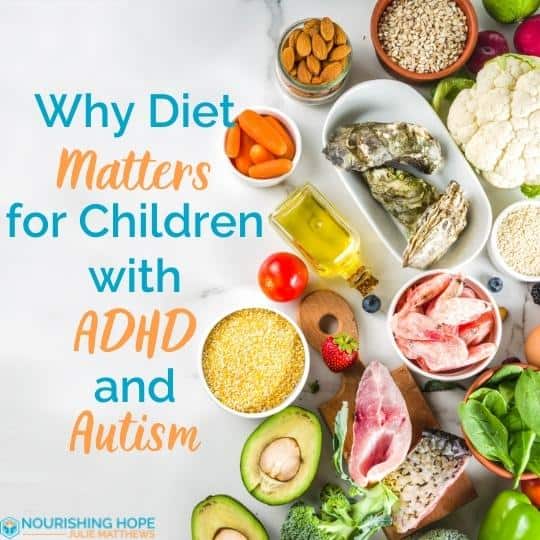Why Diet Matters for Children with ADHD and Autism
by Julie Matthews
If your child is neurodivergent, you may find it frustrating to be told by doctors that there’s not much they can do. If your child has ADHD they can go on medication – but what about the side effects? If your child has autism, you’re told it can’t be changed or influenced.
However, diet can have an amazing influence on your child’s behavior.
Does your child have:
- ADHD?
- Autism?
- Down syndrome?
- Developmental delays?
- Other neurological conditions?
If so, modifying food and nutrition choices can help reduce your child’s symptoms.
The key to Nourishing Hope is understanding that your child’s condition doesn’t exist in isolation – it doesn’t start and end in the brain. When autism and ADHD are understood as “whole body” disorders, it can become clear to you, and doctors, that when you address underlying issues, it will improve daily life for your child.
Autism and Inflammation
Autism is a complex condition, as children with autism are very sensitive to stress, environmental toxins, and deficiencies in diet. What helps to manage autism can also help other less complex conditions, such as ADHD and developmental delays.
Often a child with autism may struggle with physical symptoms such as:
- Diarrhea
- Stomach pain
- Constipation
- Food allergies
- Difficulty sleeping
- Chronic infections
- General pain
 These symptoms may appear to be caused by autism, but in fact they are provoked by the same mechanism underlying your child’s autism: inflammation caused by nutrient deficiencies and imbalanced biochemistry.1
These symptoms may appear to be caused by autism, but in fact they are provoked by the same mechanism underlying your child’s autism: inflammation caused by nutrient deficiencies and imbalanced biochemistry.1
In autism (as well as ADHD and other disorders), eczema, hyperactivity, mood swings, and inattentiveness can all be added to the above list of symptoms. Everything is connected – your child’s symptoms throughout their body are likely to be triggered by the same underlying factors. The body and brain are intrinsically linked.
What your child eats directly affects their brain, through the gut-brain connection, the health of their gut microbiome, and the availability of nutrients for the brain.2 Poor digestion can impair your child’s ability to get important nutrients to the brain for vital biochemical and brain functions. There is evidence for impaired gut microbiome, leaky gut, inflammation and immune response caused by food in children with autism.3
Children with autism often have:
- Inflammation – mainly in the gut and brain, but it can also be systemic.
- Difficulty digesting gluten and casein, which form opiate compounds, mimicking opiates in the brain.4 Unfortunately, this can make bread and pasta addictive for your child.
- Methylation malfunction affecting neurotransmitter production in the brain.
- Lowered ability to metabolize toxins.
- Poor digestion, leading to nutrient deficiencies. Patients with ADHD and autism have low iron and zinc.
- Trouble digesting carbohydrates due to low levels of the right enzymes.5
- High levels of oxalates, which can affect gut function and mineral absorption.
These aspects of poor health cause a vicious cycle of poor brain and gut health, worsening your child’s day-to-day symptoms.
Why the Standard American Diet and Autism Don’t Go Well Together
Unfortunately, the standard American diet falls short of providing a developing child with everything that he or she needs. If your child has autism or ADHD for example, a standard diet may be doing more harm than good.
All of the following have been shown to be problematic. Try cutting them out of your child’s diet:
- Artificial additives, including artificial flavors and colors – can be intercepted as toxins by your child’s body, causing more strain on an already compromised system. These additives also contain phenols, which can contribute to poor methylation.
- Preservatives – often made up of fatty acids that can worsen gastrointestinal symptoms, but also contain phenols.
- Monosodium glutamate – found in most processed food, eating it can cause an imbalance of glutamate – a powerful neurotransmitter – in the body.
- Artificial sweeteners – Many artificial sweeteners can affect the gut microbiome, or cause gastrointestinal upset.
- GMOs and Pesticides – GMOs and pesticides are a powerful form of toxin that can affect an already overloaded immune system
- Gluten and casein – as above, undigested gluten and casein can act as an opiate, causing brain fog and irritability. These foods also causes inflammation in the gut.
- Sugar – sugar is an inflammatory, that also feeds yeast in the gut, contributing to yeast overgrowth.
If you choose to cut out even just one of these foods today, you’re looking after your child’s health the best way you can. While no healthcare professional may have suggested to you that it’s possible to reduce your child’s symptoms through diet, I’m here to tell you – it really is that simple.
Nourishing Hope: Autism Diets That Help
Nourishing Hope is the process of making strategic diet and nutrition choices of avoiding the foods that harm, and adding nutritious foods and nutrients that heal.
These special diets are focused on avoiding certain foods, but it’s important to consider what nutritious food you’d like to add to your child’s diet. There is no one-size-fits-all diet for autism, ADHD or other disorders, but basing your child’s meal plan on one of these diets is a great start.
Healing diets for autism spectrum disorder, ADHD, and other neurological disorders:
- GFCF (Gluten-free and Casein-free) – designed to reduce gut inflammation, gastrointestinal issues, and opiates in your child’s bloodstream. The easiest place to begin.
- SCD (Specific Carbohydrate Diet) – A grain-free diet that limits carbohydrates, suitable for when GFCF isn’t enough. Great for inflammatory bowel disease.
- GAPS (Gut and Psychology Syndrome) – A grain-free diet that also cuts out dairy, refined carbohydrates, mucilaginous fiber, and starchy vegetables.
- Paleo – A grain-free diet that also cuts out beans, dairy, and refined sugar.
- Low Oxalate – Reduces consumption of high oxalate foods such as certain greens, beans and legumes, and nuts. Can help reduce inflammatory symptoms.
- Body Ecology Diet – Focuses on balancing your child’s gut flora and reducing yeast overgrowth. Cuts out sugar, fermented foods, and extremely acid or alkaline foods.
- FAILSAFE (Free of Additives, Low in Salicylates, Amines and Flavor Enhancers) – Restricts intake of salicylates, amines, and glutamine, through elimination of additives, preservatives, artificial flavors and flavor enhancers, and synthetic antioxidants. Emphasis placed on fresh foods. Cuts out all processed food and drink, cheese, and fruit. A popular choice for parents of children with ADHD.
- Feingold diet – a classic diet that removes food additives to reduce symptoms of hyperactivity.
Low FODMAPS (fermentable oligo-, di-, mono-saccharides and polyols) – A diet that reduces symptoms of Crohn’s disease and colitis by removing fermentable carbohydrates such as wheat, onions, dairy, and fructose.
Choosing an elimination diet is only half the story. You need to supplement with beneficial foods that supply the right nutrients for healing.
Important foods to heal your child include:
- Vegetables
- Animal protein
- Healthy fats
Most importantly, avoid thinking that one of these diets is superior to the others. What may work for one child may not for another. Understand that a therapeutic diet must meet the biochemical needs of the individual.
BioIndividual Nutrition: Healing the Individual
Although the focus has been on autism and ADHD, BioIndividual Nutrition can help people with any form of chronic disease. Nutrition is the link between your genes and your environment, and their influence on your health. Your genes, environment, and nutrition make up your biochemical individuality.
The good news is that we you can change your nutrition, or that of your child. The power is in your hands. BioIndividual Nutrition is the practice of strategically customizing nutrition needs for your unique biochemical individuality. Only then can we relive the body from burden, and restore function.
To learn more about BioIndividual Nutrition, check out Julie Matthews’ books and resources centered around her life-changing BioIndividual Nutrition method. Practitioners can learn more about BioIndividual Nutrition, and sign up for training at her BioIndividual Nutrition Institute.


